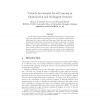443 search results - page 8 / 89 » Learning from a Population of Hypotheses |
ICRA
2009
IEEE
14 years 4 months ago
2009
IEEE
Abstract— People in densely populated environments typically form groups that split and merge. In this paper we track groups of people so as to reflect this formation process an...
GECCO
2005
Springer
14 years 3 months ago
2005
Springer
We investigate the results of coevolution of spatially distributed populations. In particular, we describe work in which a simple function approximation problem is used to compare...
CORR
2010
Springer
13 years 10 months ago
2010
Springer
We present and analyze an agnostic active learning algorithm that works without keeping a version space. This is unlike all previous approaches where a restricted set of candidate...
EACL
2006
ACL Anthology
13 years 11 months ago
2006
ACL Anthology
We present a weakly supervised approach to automatic Ontology Population from text and compare it with other two unsupervised approaches. In our experiments we populate a part of ...
GECCO
2008
Springer
13 years 11 months ago
2008
Springer
Social learning is a mechanism that allows individuals to acquire knowledge from others without incurring the costs of acquiring it individually. Individuals that learn socially c...

